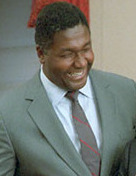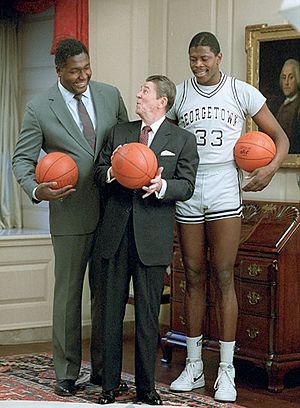John Thompson (basketball) facts for kids

Thompson in 1984
|
||||||||||||||
| Personal information | ||||||||||||||
|---|---|---|---|---|---|---|---|---|---|---|---|---|---|---|
| Born | September 2, 1941 Washington, D.C., U.S. |
|||||||||||||
| Nationality | American | |||||||||||||
| Died | August 30, 2020 (aged 78) Arlington, Virginia, U.S. |
|||||||||||||
| High school | Archbishop Carroll (Washington, D.C.) |
|||||||||||||
| Listed height | 6 ft 10 in (2.08 m) | |||||||||||||
| Listed weight | 269 lb (122 kg) | |||||||||||||
| Career information | ||||||||||||||
| College | Providence (1961–1964) | |||||||||||||
| NBA Draft | 1964 / Round: 3 / Pick: 25th overall | |||||||||||||
| Selected by the Boston Celtics | ||||||||||||||
| Pro career | 1964–1966 | |||||||||||||
| Coaching career | 1966–1999 | |||||||||||||
| Career history | ||||||||||||||
| As player: | ||||||||||||||
| 1964–1966 | Boston Celtics | |||||||||||||
| As coach: | ||||||||||||||
| 1966–1972 | St. Anthony HS | |||||||||||||
| 1972–1999 | Georgetown | |||||||||||||
| Career highlights and awards | ||||||||||||||
As player:
As coach:
|
||||||||||||||
|
Medals
|
||||||||||||||
John Robert Thompson Jr. (September 2, 1941 – August 30, 2020) was a famous American college basketball coach. He is best known for coaching the Georgetown Hoyas men's team. He made history by becoming the first African-American head coach to win a major college basketball championship in 1984. That year, he led the Hoyas to the NCAA Division I national championship. Thompson was later honored by being inducted into both the Naismith Memorial Basketball Hall of Fame and the National Collegiate Basketball Hall of Fame.
Before becoming a coach, Thompson played college basketball for the Providence Friars. He even earned special recognition as an All-American in 1964. After college, he played for two seasons in the National Basketball Association (NBA) with the Boston Celtics. During his time with the Celtics, they won two NBA championships. After his playing career, Thompson coached high school basketball in Washington, D.C. before taking over the Georgetown team for 27 seasons. After he retired from coaching, he became a sports commentator on radio and TV. Thompson also earned a Master’s Degree in Counseling and Guidance.
Contents
Early Life and High School Success
John Thompson was born and grew up in Washington, D.C.. He was raised in the Roman Catholic faith. His mother wanted him to attend Catholic schools because they offered great learning opportunities and academic challenges.
At Archbishop Carroll High School, Thompson became a star basketball player, playing as a center. He helped his team reach the City Championship game three years in a row (1958–1960). In 1960, during his senior year, Thompson led Carroll to a perfect 24–0 season. They also kept a winning streak of 48 games alive! Carroll finished that amazing 1960 season by winning the Knights of Columbus National Championship Tournament. Thompson scored 15 points and grabbed 12 rebounds in the final game. He was named to the all-tournament team and was later recognized as a second-team Parade All-American.
Playing Career Highlights
After high school, Thompson went to Providence College. He was part of the team that won the NIT Championship in 1963. In his senior year (1964), he helped Providence reach the NCAA tournament for the first time. He also received an honorable mention as an All-American from the Associated Press. When he graduated, Thompson was the Friars' all-time leader in points and scoring average.
In 1964, the Boston Celtics picked Thompson in the third round of the 1964 NBA draft. He played two seasons in the National Basketball Association (NBA) for the Celtics, from 1964 to 1966. Standing tall at 6 feet 10 inches and weighing 270 pounds, he was a backup player to the Celtics' famous star center, Bill Russell. With Thompson on the team, the Celtics won two NBA championships in a row. He was sometimes called "The Caddy" because he played a supporting role to Russell. Thompson decided to retire from playing basketball in 1966 instead of moving to Chicago to play for the Chicago Bulls.
Coaching Career Journey
Building a Dynasty at Georgetown
After his NBA career, John Thompson became a guidance counselor and head coach at St. Anthony High School in Washington, D.C.. From 1966 to 1972, his team had an impressive record of 122 wins and only 28 losses. He then left St. Anthony to become the head coach at Georgetown University.

When Thompson took over the Hoyas team, they had a very tough season the year before, winning only 3 games and losing 23. But Thompson quickly turned things around! By his second season, the Hoyas had an even record of wins and losses. In his third season (1974–75), Georgetown made it to the NCAA tournament for the first time since 1943.
Over 27 years, Thompson's Hoyas teams won 596 games and lost 239. They made it to the postseason 24 times in a row, including 20 NCAA tournament appearances. From 1979 to 1992, they had an amazing 14-year streak of NCAA appearances. During this time, they reached the Final Four three times: in 1982, 1984, and 1985.
The 1984 team, led by the incredible 7-foot center Patrick Ewing, won the Division I national championship. This was a huge moment, as Thompson became the first African-American coach to lead his team to the title. Two years earlier, in 1982, he had already become the first Black coach to take his team to the Final Four. In 1985, Georgetown almost won another championship but lost in the finals to Villanova.
Thompson was a very noticeable figure on the sidelines during games. He was known for always carrying a white towel on his shoulder, which he did as a special tribute to his mother. He won many "Coach of the Year" awards, including three from the Big East. Thompson coached many famous players who later became NBA stars, such as Patrick Ewing, Alonzo Mourning, Dikembe Mutombo, and Allen Iverson. Under his coaching, 26 players were chosen in the NBA draft, and eight of them were picked in the first round. Thompson also made sure his players did well in school, and an impressive 97% of his team members graduated.
Coaching the US National Team
John Thompson also coached for the US national team. He was an assistant coach for the team that won a gold medal at the 1976 Olympics. Later, he became the head coach for the 1988 Olympic team. This was the last time the American Olympic basketball team was made up entirely of college players. The US team won the bronze medal at those games.
Standing Up for Student Athletes
On January 14, 1989, before a game against Boston College, Thompson did something remarkable. He walked off the court and let his assistant coach take over. He was protesting a new rule called Proposition 42. This rule would have stopped some student athletes from getting scholarships if they didn't meet certain academic standards. Thompson was worried that this rule would make it harder for many student athletes, especially Black athletes, to afford their education. He felt it was important to stand up for their right to get an education.
Retirement from Coaching
On January 8, 1999, Thompson announced he was stepping down as Georgetown's head coach. He was replaced by his longtime assistant, Craig Esherick. Later that year, on October 1, 1999, Thompson was inducted into the Naismith Memorial Basketball Hall of Fame.
In 2004, Thompson's oldest son, John Thompson III, became the head coach at Georgetown. John Thompson III coached the team until 2017. Thompson's younger son, Ronny Thompson, also became a basketball coach.
Life After Coaching
After retiring from coaching, John Thompson continued to be involved with Georgetown University as a special consultant. He also became a basketball commentator for TNT and hosted his own sports talk show, The John Thompson Show, on WTEM radio in Washington, D.C.
In a remarkable event, John Thompson was scheduled to be on American Airlines Flight 77 on September 11, 2001. However, his seat was cancelled, and he did not board the plane. Years later, he even reunited with the ticket agent who had cancelled his seat.
In 2016, Georgetown University opened the John R. Thompson Intercollegiate Athletic Center, named in his honor. The lobby of the center features a statue of Thompson. His autobiography, I Came as a Shadow, was published after his death in December 2020.
Death
John Thompson passed away at his home in Arlington, Virginia, on August 30, 2020. He was 78 years old, just three days shy of his 79th birthday.
See also
 In Spanish: John Thompson (baloncestista) para niños
In Spanish: John Thompson (baloncestista) para niños
- List of NCAA Division I men's basketball tournament Final Four appearances by coach

